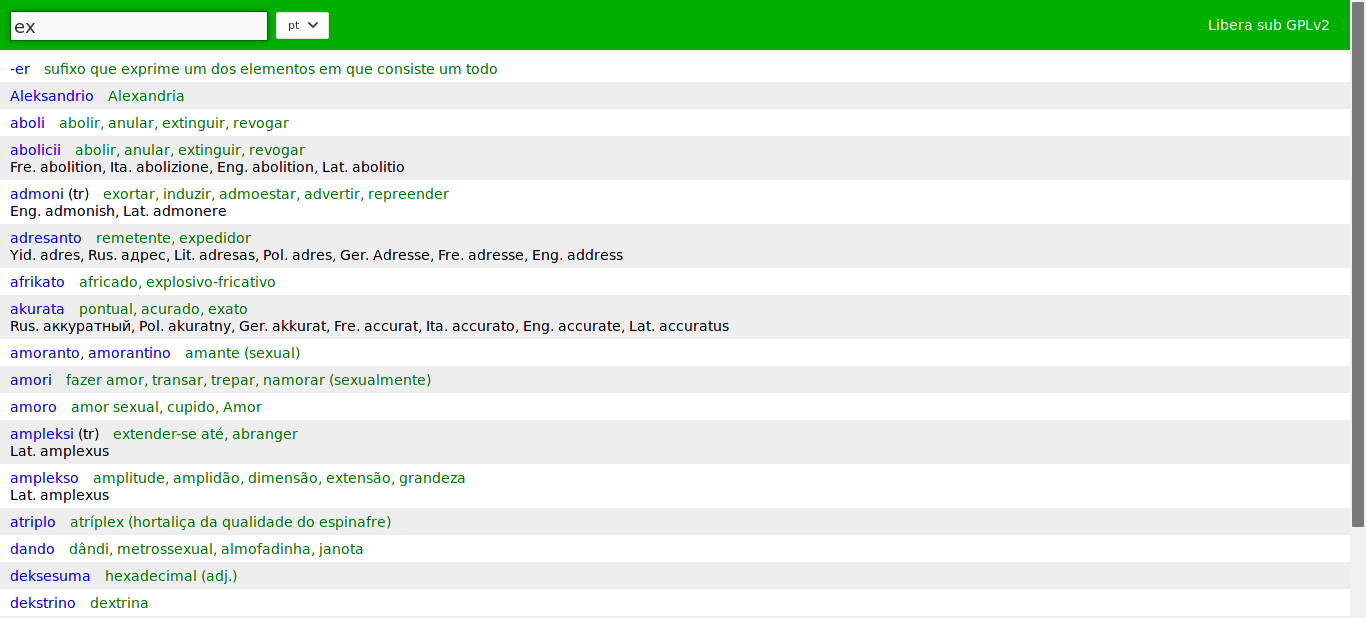Reviews by pizzaiolo
Eble mi malpravas, sed mi kredas, ke neniu enreta vortaro Portugala-Esperanta estas tiom plena ol la zorgata de la brazilano Túlio Flores, nek la mita Lernu!. Flores preterpasas la minimuman postulaton por modesta vortaro, aldonante slangojn, brazilajn esprimojn, loknomojn kaj fakan terminologion al lia riĉa arĥivo.
Kvankam, bonus vidi la vortaron eldonita sub libera Krea Komunaĵa permesilo (CC0, CC BY aŭ CC BY-SA), kaj en pli “amikema” formato por reuzado de programistoj. Nova fasado ankaŭ estus bonega, sed sen la malinda ĜavaSkripto, bonvolu!

Ĝi estas sendube la plej tuja vortaro enrete, kaj permesas vin ekkoni novajn esprimojn rapide kaj efike. La Tuja Vortaro baziĝas sur libera enhavo (ESPDIC, eldonita sub GPLv2), kaj ĝi mem estas libera programo kun la fontkodo disponebla ĉe GitHub.
Malgraŭ tiu boneco, ĝi povus pliboniĝi. La vortaro ne multe ampleksas, kaj estus bona havi aliajn fontojn serĉeblaj. Krome, ĝi ankoraŭ ne funkciigis HTTPS, tre grava ilo por uzanta sekureco kaj privateco nuntempe.
I’ve had my qualms about Uber for a while now. It’s Silicon Valley’s ‘slick’, ‘disruptive’ new way of rolling back centuries in terms of labour rights. But without ever taking one, my views were more academic than personal.
Last night this changed. A friend of mine hailed an Uber and I hitched a ride with her. The polite driver offered us water and candy. When we mentioned we were sitting on something that seemed like a trunk shelf or floorboard, the driver apologised profusely, nervously joking that we’d probably rate him with zero stars on Uber’s app, in a scene that was eerily reminiscent of Black Mirror’s dystopian “Nosedive” episode.
To see this overworked, poorly paid man constantly asking for pardon while anxiously trying to get higher ratings was a depressing sight, but understandable given the system he’s in. The sad thing is, many people would have considered this horror show ‘great customer service’.
William Gibson’s 1984 novel Neuromancer is considered one of the greatest works of cyberpunk fiction. Hence my excitement when I began reading it, as a big fan of cyberpunk aesthetics and motifs myself. Even if you disregard the technobabble, which is a significant portion of the book, it still makes very little sense. The constant, vivid description of impossible surfaces does not seem like is meant to be understood literally, but as a metaphor for something else which eludes this reviewer. Most of the time reading the book, the readers will likely find themselves struggling to understand what exactly is happening under all that made-up jargon that mixes up 80’s futurism (which is fine) with authentic, unexplained original concepts and a pinch of redneck Americana parlance, which completely undermine the aesthetics and design that a cyberpunk enthusiast would expect. The inclusion of “Rastafarians” doesn’t help either.
Watching Blade Runner, Ghost in the Shell, Akira, or reading Do Androids Dream of Electric Sheep? will not prepare you for this monumental let-down. Avoid it.
The Quinta da Boa Vista (English: Estate with the Good View) is a beautiful park in Rio de Janeiro, one of the few green spaces in the North Zone. It’s a great place to take your family on holidays for a picnic, or maybe to visit the National Museum, former home of Brazil’s Imperial Family in the 19th century which now houses art, history and even dinosaur fossils!
All in all, it’s a fantastic option not only for city residents but also tourists. There is no fee to enter the park, which makes it even more appealing for visitors on a tight budget.
This Arch-based distribution has all the goodies and flaws you’d expect from Arch, except in this case, all proprietary software is removed, and you can be sure that you’ll never accidentally get software from the repos that does not respect your user freedoms.
The main advantage over Trisquel in my opinion is the constant updates, which make it continually fresh. Also, I’ve had pretty much no stability problems during these two years of continual usage. The main setback, for new users, is that you need the Arch wiki to do the most basic of things that come out of the box in Trisquel. But both are pretty great, depending on your needs.
